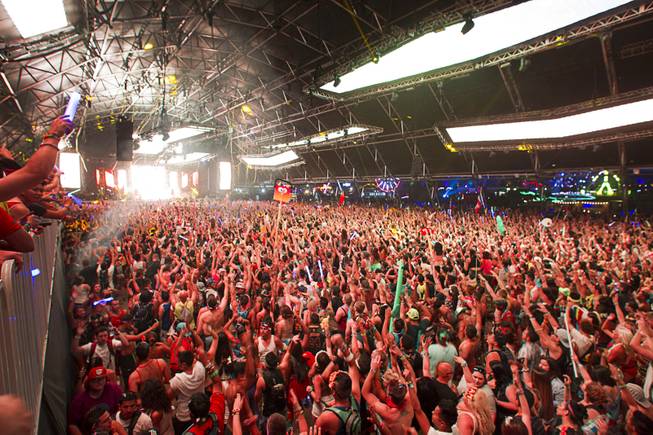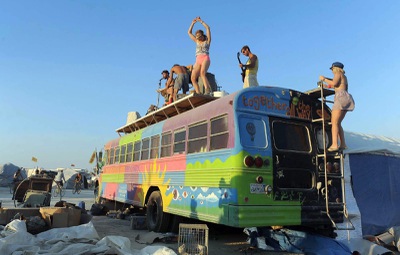
Fans pack the Circuit Grounds stage as Calvin Harris performs during the final night of the 2014 Electric Daisy Carnival on Sunday, June 22, 2014, at Las Vegas Motor Speedway.
Friday, June 12, 2015 | 2 a.m.
Upcoming changes to a Nevada tax on entertainment have casino representatives breathing a sigh of relief, but the organizers of two annual festivals that contribute millions of dollars to the state economy aren’t happy.
Gov. Brian Sandoval signed a bill on Thursday that aims to simplify the state’s live entertainment tax, which many big casinos and resorts have to pay. The bill replaces the current tiered system with a uniform levy on tickets and clarifies a complex set of qualifications and exemptions.
Organizers of Burning Man and the Electric Daisy Carnival don't like the bill because it means the tax will be imposed on them for the first time. Yet supporters say it will eliminate a lot of confusion for the casino industry about when the tax is applied.
“The taxing authorities have had a difficult time trying to draw clear lines of what is live entertainment and what isn’t,” said state Sen. Mark Lipparelli, R-Las Vegas, one of the bill’s sponsors. “That was partly just as a result of the way entertainment has evolved in Nevada. It probably, at the time (the tax) was established, seemed more clear. But as entertainment options evolved in Nevada, it became much more difficult.”
Currently, whether the tax is applied and how high the rate is depends on the size of a venue and a series of other considerations. Under the changes in the bill, the tax rate for everyone will be 9 percent of the admission charge.
Nevada Resort Association President Virginia Valentine said her group, which lobbies on behalf of the casino industry, has been pushing for reform of the tax for the past two legislative sessions. Like Lipparelli, she said the current law created far too much ambiguity for taxpayers.
“It wasn’t clear when something was entertainment and when it was happening in the background or incidental to something else,” Valentine said. “We very much supported the bill. We think it’s going to make it easier for both the regulators and the industry to interpret.”
For example, the old law exempted entertainment in a restaurant, as long as there was no charge and it was incidental to other activities or part of the ambiance. That left a lot of room for interpretation — and disagreement — about what, exactly, qualifies as incidental or ambient. The new bill removes that exemption and renders it irrelevant with the clearer requirement that the tax kicks in when establishments charge for admission.
Questions about when to apply the tax arose regularly, according to Gaming Control Board Member Terry Johnson, who estimated that the bill could resolve around 80 percent of such disputes. The control board is responsible for collecting the tax from all gaming establishments — think big resorts on the Strip — while the state Department of Taxation collects it from everyone else.
According to Johnson, the control board collected nearly $140 million in live entertainment taxes in fiscal year 2014, while the taxation department collected nearly $15 million.
The bill removes exemptions for outdoor events and nonprofits, so Burning Man and EDC will be included in the second group of taxpayers. The only way for a nonprofit such as Burning Man to avoid taxation under the bill would be if sold fewer than 7,500 tickets; Burning Man draws more than 60,000 people.
Naturally, the groups behind those desert festivals are not enthusiastic about what is for them a brand-new expense, though neither will have to pay it until next year. Burning Man released a statement calling the tax reform “misguided” and emphasizing that its participants contribute upward of $40 million to the Nevada economy.
Burning Man also doesn’t agree that it constitutes entertainment. Its statement said Black Rock City, the temporary desert gathering created by Burning Man patrons, is “a community of individuals who create their own experience.”
“There is no entertainment provided,” Burning Man’s statement said.
EDC organizer Insomniac, meanwhile, issued a thinly veiled threat to take its business elsewhere because of the tax, claiming the changes could cause the electronic dance music event to operate at a loss.
“That's simply not a viable long-term strategy for any successful business,” the Insomniac statement said. “One thing is certain, we never shy away from a challenge, and we hope that we can find a way to produce Electric Daisy Carnival moving forward, while still maintaining the quality experience that our fans expect from us."
EDC has generated more than $1 billion in economic output for Clark County over the past five years, according to Insomniac.
Lipparelli is sensitive to the concerns of the festivals but said he thinks they’re both socially conscious businesses that understand Nevada is an ideal place to host their events.
Fixing the tax was also about fairness for Lipparelli, a former chairman of the Gaming Control Board.
“There’s a real imbalance to charging someone an admission tax when they’re inside a building and not charging someone a tax when they’re outside a building for the exact same activity,” he said.
The major festivals aren’t the only new taxpayers under the bill. Disc jockey performances, which could be easily excluded before, will also be subject to the tax, as will escorts.
But exemptions persist. NASCAR, for instance, can avoid the tax if it holds two or more races at a Nevada racetrack in the same calendar year. The bill also doesn’t consider go-go dancing to be live entertainment.
Carole Vilardo, president of the Nevada Taxpayers Association, supported the changes to the tax, but she thinks lawmakers should go further.
“I would like to see the rate lower than 9 percent, and to do that, you have to have the tax apply as broadly as possible,” Vilardo said. “While we’ve broadened the tax, we haven’t broadened it to the point that we could drop the rate even more.”
The bill’s provisions will apply beginning Oct. 1.


Join the Discussion:
Check this out for a full explanation of our conversion to the LiveFyre commenting system and instructions on how to sign up for an account.
Full comments policy